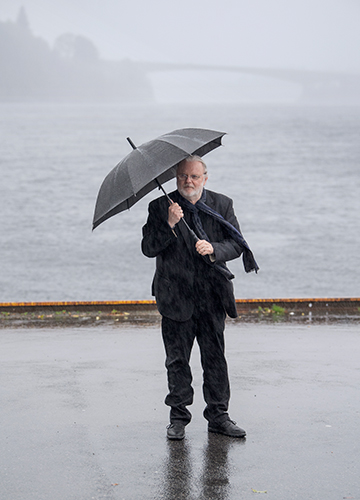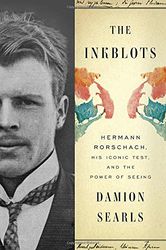Damion Searls, a Harvard educated writer and translator, first read a novel by 2023 Nobel Prize winner Jon Fosse around 20 years ago. He read the German version of Melancholy as he did not then know Norwegian. Searls found the book brilliant and decided it was time to learn Norwegian. He enlisted help from a Norwegian-born co-translator and translated the book into English.
He has since translated multiple works of Fosse, including Septology, a novel in seven parts, published in three volumes.
Fosse is not the first Nobel laureate he has translated―Searls says Fosse was the eighth. The other seven were Patrick Modiano, Hermann Hesse, Thomas Mann, Andre Gide, Elfriede Jelinek, Peter Handke and Gunter Grass (short pieces by the last two). But, Fosse is the one Searls has worked longest and closest with. Searls, who has a PhD in English, is known for his strong grasp of German, Norwegian, French and Dutch. He has written a book on Hermann Rorschach, who created the inkblot test, and has translated many classic modern writers, including Proust, Rilke, Nietzsche, Ingeborg Bachmann and Alfred Döblin.
Interestingly, the man who has received writing and translating awards from global institutions and universities, and from the Austrian, Belgian and Dutch governments, went to college to be a physics major. He ended up majoring in philosophy and then went to graduate school for English. Translation was how he pivoted into writing, but it was never something he formally studied.
He has about 10 finished translations coming out soon, including a debutante Swiss novelist (her book is called Overstaying and it is hilarious, he says). Then, the next couple of years will be spent on Fosse’s backlist, he says. These include early novels, children’s books, poetry, and a new trilogy of novels.
Searls says that Fosse had been rumoured to be a frontrunner for the Nobel for years and in 2023 it seemed likely. So, he was watching the live stream at 6am in the US. “I understand enough Swedish that when the head of the academy said ‘Norwegian writer’ I knew it was Fosse a second before he said the name,” he says.
In an exclusive interview, Searls shares his learnings and the experience of translating Nobel winners. Excerpts:
Q\Your book, The Philosophy of Translation, is due for publication. Could you tell us about your evolution as a translator?
A\ My ideas about translation have not changed much, though I think I am a better translator than I used to be, because I am a better writer. I do not translate in an intellectual, analytical way. I just try to make the sentences sound good. The Philosophy of Translation does talk about translation in a more conceptual way. But it is all after-the-fact―the act of translation itself is quite intuitive.
Q\ How did you first read Jon Fosse’s work and what was your impression of him?
A\ It was just a job. This publisher who had heard about Fosse did not have anyone to read Norwegian. But, the book had been translated into German, so they sent me the German translation of Melancholy. I was solely a translator from German at the time. It was a very good translation. I read the book and said it was total genius; you should absolutely publish it. The publisher said: ‘Thank you very much. Here is your hundred bucks,and we are not, in fact, going to do it.’ Which is usually what happens. I asked them if I could take the project elsewhere else, and found a US publisher, found a co-translator and learned Norwegian in the process of doing this book together.
The co-translator, Grethe Kvernes, who is a native speaker of Fosse’s version of Norwegian, did a first draft―Norwegian to English―and I sat there with the English and the Norwegian. I knew what the Norwegian said because I had the English. When I could not figure out how they went together, I could triangulate with German as Norwegian is a Germanic language. At first, I was worried that I would not have anything to do besides editing it a little bit, and I did not want to claim to be a co-translator if all I am doing is touching it up. But actually, I ended up making hundreds of changes on every page in terms of getting the rhythm, and we went through seven or eight rounds together. I do think it is fair to call it a co-translation, and that is how I learned Fosse’s Norwegian.
Q\ It is often said that the essence or flavour of a work is “lost in translation”. How do you make sure this does not happen?
A\ This is a needlessly pessimistic way to think about it. And I also do not think it is true to how anyone, except the most uptight reader, actually reads. We all get to know the essences and flavours of world literature in translation and few people feel that because of translation they are totally cut off from the wider world. On the contrary, we feel that translation works. It is thanks to translation that we can read Homer and Kafka and Tolstoy and Cervantes and Ernaux and the Bible and the Ramayan. No one reads everything in the original. A translated work is different from the original. The words are different, but, by definition, it gains as much as it loses (if it loses all the Norwegian words, it gains all the English words).
Q\ How did you become multilingual?
A\ Some people learn by conversation―to learn Spanish or Catalan they go to Barcelona and head out to a nightclub―but I learn by reading. Wanting to read something is what motivates me to look up vocabulary, decode syntax and figure it all out. I do not fluently speak all the languages I translate from, but I read them well. It is being a good reader that taught me the languages, not the other way around.
Q\ Could you share some anecdotes from your interactions with Fosse?
A\ He has always been responsive, kind and a great correspondent by email, which is how I communicate with him. He is widely translated and is a translator into Norwegian himself. So he understands how translation works and knows he has to trust translators to make their own decisions. He does not micromanage anything, but he has always been there to answer any questions I had. The trust he has in me is something I really treasure.
I have told this story before, but my favourite communication from him was about the title of his novel Aliss at the Fire. The Norwegian title is Det er Ales, which means ‘that is Ales’ or ‘it is Ales’; the woman’s name in the original is Ales. Unfortunately, this is a word in English, and we could not call the novel ‘It is Beer!’ So I emailed Fosse to ask two questions: What did the name Ales mean to him and what did he want the title to convey? I had noticed that the book’s first burst of short sentences, after 40 or so pages flowing by without a full stop, included the sentence ‘det er Ales’. So the title should refer to that moment in the book, but what else? Fosse told me that Ales was a very old-fashioned name, “Maybe your grandmother might have known an old woman named Ales.” He had a great-great-grandmother named Ales who was known as a “wise woman”, a healer, who got into trouble with the local priest at one point, but avoided punishment. About the title, Fosse said: “It means Ales is spreading out over the whole universe.” I love these answers, especially the second answer―they are like how I imagine a genius director does not tell actors what to do, just offers some comment that makes the actors realise they already know. I realised the character’s name should be recognisably a name, but unusual, mysterious, with a certain aura―not contemporary like Alice or Alissa. And the title should be something archetypal: a universal moment or image from that burst of short sentences.
We did not actually meet in person until May 2022, when we were finalists for the International Booker Prize and we both went to London. I think we slipped quite easily into in-person conversation, since we had understood and liked each other for so long already.
He is a big fan and collector of fountain pens, different kinds of ink, and so on. So most of the time we talked about that.
Q\ You say Fosse’s writing speaks to everyone. Please elaborate.
A\ He is the most produced living playwright in the world, with something like a thousand productions in 50 languages. I think in English we tend to assume that if writing is not populist and trashy, then it must be elitist and difficult. But, Fosse is not creating intellectual puzzles or mysterious artefacts for academics to analyse. He is writing books about people for people to read. He is often compared to [Samuel] Beckett, and I think that is true of Beckett, too, by the way―you can try to say Beckett is ‘difficult’, but people love his work. I think journalists who emphasise, ‘OMG it is a 700-page book with no full stops’ are being more misleading than anything. I have heard from lots of readers who tell me ‘I was scared off by the reviews, but when I read it, it was great’. That “700-page book with no full stops” has characters, scenes and dialogue. It is not all philosophical, though there is some of that, too. His dialogue is moving and funny. I think it is amazing. What the characters say shifts our sense of them, it is surprising. It is never just stating information but always revealing how this person exists in the world. I think it is Fosse’s playwriting chops that let him do that.
Q\ How much time does it take you to finish a book by Fosse?
A\ It depends. His new book, A Shining, is 50 pages long, while Septology is close to 700. You cannot help but read slowly when you are translating. There is no skimming. You need to put in the time on every sentence, look up every word you do not know, decide how you are going to resolve every ambiguity. (I do not mean simplifying the text and removing ambiguity; I mean deciding which possible option in English you are going to use.) I do not read the books in advance. I translate as I go along, so that means I always read Fosse slowly. Which I think works well with his writing, luckily!
Q\ How are you celebrating the Nobel Prize?
A\ I got to go to Stockholm and even bring my son to the Nobel ceremony and banquet! It was the experience of a lifetime, something even my teenage son eventually had to admit.





